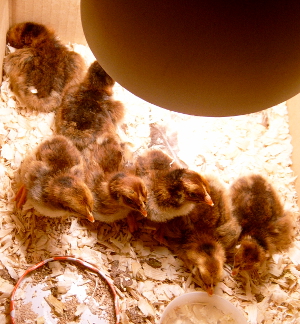The Ultimate guide to buying chickens

Table of Contents
- Getting ready your poultry.
- How many chickens should I get?
- Which breed should you choose?
- What about bantams?
- How much should you pay for Chickens?
- How do I know the chickens are healthy?
- Buying birds from a breeder:
- Buying chickens at auction:
- Chicken suppliers and grower farms:
- Rescue and Ex battery chickens:
- Hatch your own:
- Day old chicks in the post or from the store:
- From a poultry show.
- Joining a local poultry club or Facebook group:
- Finally – Don’t forget to take a box! With holes in!
Getting ready your poultry.
Set up their environment before you get your chickens and be ready for them when they arrive. Stress is the number one cause of problems with new birds, and can make them susceptible to disease or fight.
I would make sure to have food, water, feeders and whatever equipment you need ready before they arrive.
Never buy chickens from someone who insists you take a rooster or can only purchase a trio.
Below: This is a flock of my hens: Part of a total of 300 or so I look after. I have a mix of hybrids and heritage types.
Beware of chicken maths, this is where 3 hens + 3 hens = 16 chickens or "I promise were only getting 1 or 2 more and now we need a bigger coop"
Have a plan to get them from their crates into the coop and plan to do it at dusk. The low light levels will keep them subdued and they will have a quick feed and drink and then roost.
This is to be encouraged and try to keep a little distance so as they do not feel threatened.
Top tip for adding new chickens to the flock: You can try what I like to call my "rub with rosemary trick" . It involves putting a strong smelling herb like Rosemary, Sage or Lavender in a blender and then rubbing it over the birds and sprinkling it in the coop. Then everyone wakes up the next morning smelling the same. It might be that the birds you choose do not know each other and it helps to integrate the flock. You might be surprised at the results.
How many chickens should I get?
Chickens are flock animals and should be kept in a group. As a minimum I would say to get at least three. Chickens are very much social creatures and do not thrive alone.
You should sit down with a bit of paper and a pen for a few minutes to make sure you get the right number of hens at one go as adding odd hens later when they first batch has settled in can be frustrating and time consuming.
Questions to ask yourself before you get chickens:
- Have you got the space for the number of birds you are thinking of?
- What breed would I like?
- Am I allowed them? Some places are limited to six with no roosters.
- Am I limited by an urban environment?
- How many eggs do I normally eat in a week.
Say you get through 35 eggs a week as a family.
Then you need 5 or 6 hybrids or 6 to 8 heritage types or 10 to 12 bantams. Bantams can lay as many eggs as their larger cousins the eggs are just smaller.
Finally is it worth getting the extra hen or two if you are undecided, I found the eggs are nicer and I get through a lot more of them since I was not buying them at a store and it helps to mitigate the seasonality of eggs.
Hybrids are less seasonal but can still off days when the days are short and most birds moult at some stage every Autumn or Fall and will generally stop laying for 2 to 6 weeks about this time.
It may be worth getting the extra hen as production will taper off over the years and eggs are easy to sell on. Older hens lay fewer eggs.
As with so many of the questions in poultry keeping the answer is - It depends and as a natural product unpredictable.
Which breed should you choose?
As regards the size of chicken you want to keep it will depend on the area you give over to your poultry concern. Silkies make exceptional pets and are good small area birds. They cannot fly at all but the trade off is they are not the most productive of egg layers.
Consider a winter hardy breed like the Barnevelder that will lay eggs all winter otherwise plan to live with a surplus in spring and a shortage in winter.
Below: Cold hardy breeds include those with smaller combs and a generally larger body size.
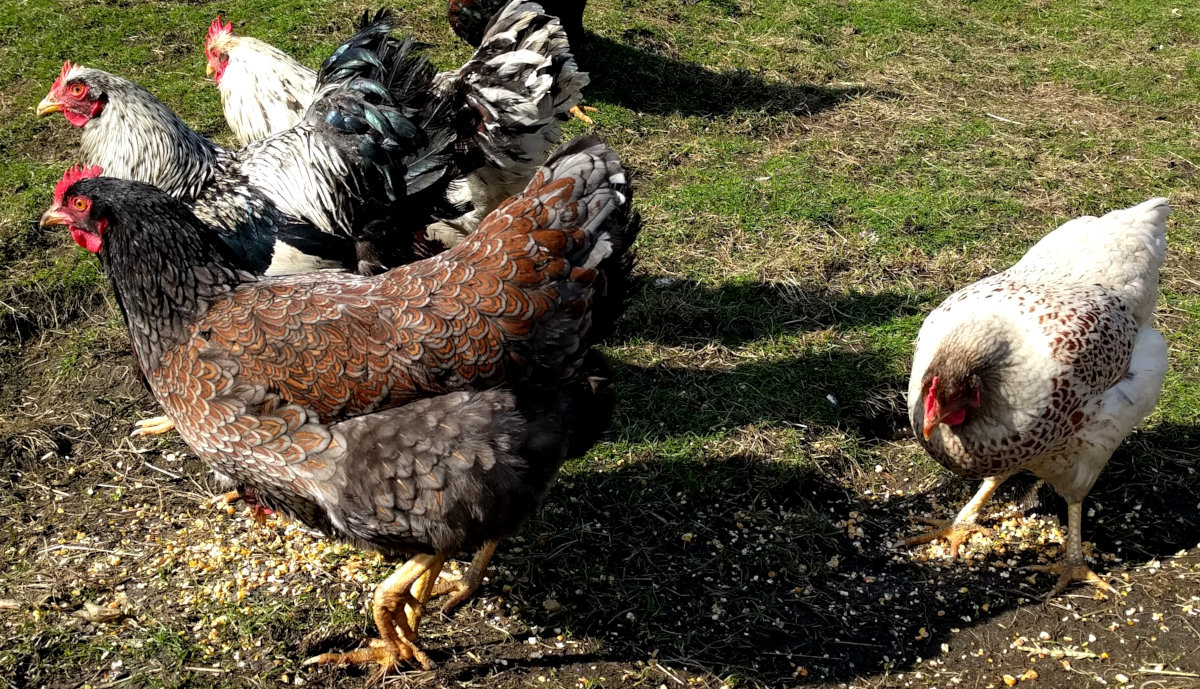
They also tend to be fluffy or soft feathered.
These are breeds like the Orpington, Cochin, Barnevelder and Welsummer. They originate in the cooler parts of the Northern hemisphere and are well adapted to snow and sub zero temperatures.
If you have long hot summers and mild winters you should consider Hybrids, Andalusian, Leghorns and Polish chickens.
I keep bantams without a problem in North Yorkshire and it regularly freezes or snows for extended periods.
For brown eggs consider Marans, Barnevelders or Welsummer.
For green or blue eggs consider Cream crested Legbars or one of the coloured egg hybrids.
Olive eggs are still quite rare but can be found. Or you can breed them yourself.
What about bantams?
Don't discount bantams, they can be friendlier and easier to keep. Polish hens are delightful and quite productive. I have Bantam Barnevelders and they take up much less room than their large fowl counterparts.
Below: Some of my silver laced Wyandotte bantams.
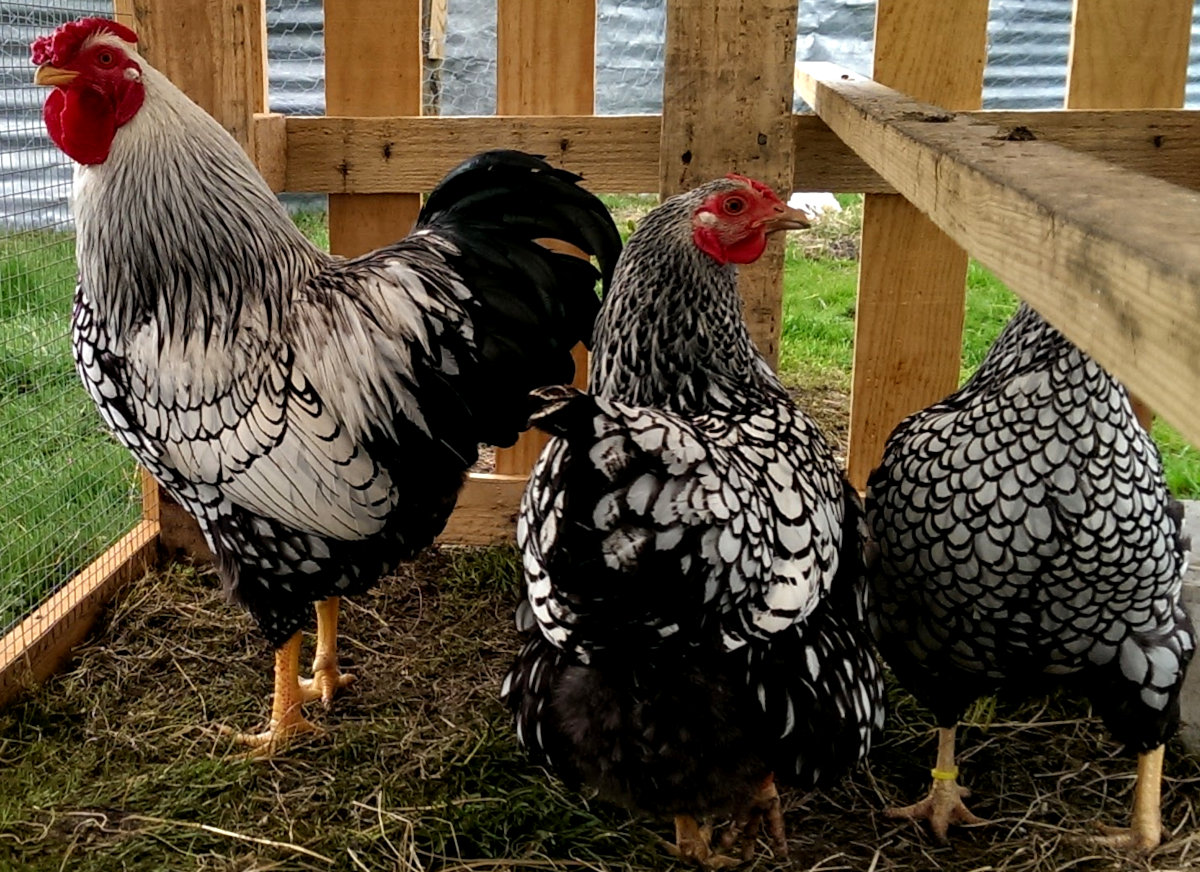
Don't discount bantams, they are smaller, easier to look after and need less space. These Silver Laced Wyandotte Bantams lay a surprisingly large egg for a small bird. They may also be less intimidating if you have young children or spouses that dislike chickens.
How much should you pay for Chickens?
After doing quite a bit of research it turns out the prices of poultry in the UK and US and broadly similar in £ and $ amounts. I say broadly, it seems that chickens in the US are 10 to 20 % more expensive than we pay here in the UK.
All prices vary and can be seasonal as well so please bear in mind it could be as much as 20% either way depending on supply and demand.
There are a few rules of thumb that apply to buying chickens.
- Younger is cheaper - I once bought 500 day old chicks, sexed hybrids, for 67 pence each, or just under a dollar each. All vaccinated and delivered.
- Unsexed is cheaper - Or straight run. Determining gender costs money and time and as hatched is normally the cheapest.
- Bulk is cheaper - If you just want two or three hens they will cost more than if you are getting a truckful.
- Avoid spending big money unless you know what you are getting.
- You pay a premium for POL or convenience.
- Rushed purchases usually involve regret afterwards.
Day olds:
Day old chicks start from £1 or $1 for bulk unsexed or straight run.
It depend how many you are buying. If you get 10 they will likely be £/$2 or £/$3 each and sexed chicks are likely to be a pound / dollar more expensive as well.
Unless you are getting something really special or rare then you should not be paying more than £/$4 a chick. Rare breed chicks can be anything from £5 or $10 all the way to £50 or $100. I see greenfire farms sell Silver laced Barnevelders unsexed day olds at $59
Growers:
I charge about £1 a week of age in addition to the chick price. Contract rearers can easily do it for half this price. That Would make a six week old chicken off heat around £10 to £12. McMurray hatchery in Iowa Sells sexed Red Stars For $17.50 or so which is quite similar barring exchange rate fluctuations.
POL:
I can buy standard brown hybrids from £5.50 if i'm getting 25 or more, they are £10 each if bought singly. The coloured egg layers like the Speckledy are £16 Point of Lay. If you buy a POL Barnevelder hen from me it will set you back £35 or around $50
Rare breeds:
These tend to be expensive. If you want Ayam-Cemani for example you will be paying $200 a chick or four to six hundred for a pair or trio.
You should be able to buy a trio or three rare breed hens from a breeder for £120 or $120 or thereabouts. If it is going to be much more than that I would think again.
For reference the top price I ever paid for chickens was £240 ( around $300 ) for a trio of blue splash Barnevelders at auction.
How do I know the chickens are healthy?
Here is what I look for in healthy chickens:
- Happy and mobile - They will be scratching around, curious and on the move.
- Bright clear eyes - Hold the birds you are buying and look for bright clear and responsive eyes. No bubbles, clouding or malformations.
- Easy Gait - They will walk without a limp or funny leg kicking.
- Symmetrical down the middle line - No bent tails or beaks or kinked necks.
- Smooth even legs - even colouring with no raised scales or missing ( or surplus) toes.
- Clean bottom and vent - avoid birds with a messy bum. A clean vent is a necessity.
- Evenly feathered - Missing feathers might indicate mites or fleas. Ruffled feathers could be a disease.
- Eating - Avoid overly skinny or fat chickens.
- Preening - Healthy birds will preen and have bright well placed feathers.
- Scratching - Birds need to scratch about and if they don't it may indicate a problem.
- Good stance and shape - Avoid hunched chickens or those that spend time resting on the floor for to long.
- Good red comb - Even deep red. Avoid blue, purplish, tinted or pale combs.
- Wings - Should be even and move freely and not be droopy or twisted.
- Beak - both nostrils clear with no discharge. normally a chicken should breathe with it's beak closed, avoid a panting bird.
Below: This is Cream Crested Legbar Hyacinth, named after Hyacinth Bucket of the TV series Keeping up appearances. Strutting about like she owns the place. She is however a good example of what to look for: Clean, bright eyes, active and with a good shape and red comb.

If you are unsure then avoid buying that particular bird.
Buying birds from a breeder:
The top tips for purchasing birds from a breeder - As a breeder I get to see that quite a few prospective chicken owners are unprepared and might be easily manipulated by an unscrupulous dealer just after a sale.
I would argue that purchasing birds form a good breeder is far better than getting chicks from a large commercial hatchery, although there are plenty of good reasons to choose hatchery birds, which are more motivated by profit whereas breeders tend to have more reason to produce better stock.
There are a lot of very good breeders with very high quality birds, there are some that ether are not knowledgeable about the birds they raise, or just plain deceptive about the birds they are producing, selling poorly bred stock or unfinished breeding stock.
Using a little common sense and taking a few precautions can insure you have a good experience buying birds from a breeder. Here are a few helpful tips:
Will the breeder sell you the birds you want, for example, will they let you have 3 hens instead of a trio including a cockerel. See these tips below for buying birds at an auction.
Become familiar with the breeds you want to keep:
The best way to avoid getting ripped off by a less than knowledgeable or deceptive breeder is to become familiar with the breeds or species you plan on getting. If you plan on buying show birds, read the Standard of perfection first, so you will be able to judge to quality of the birds.
A common mistake many people often make is buying Easter eggers that were sold to them as Ameraucanas or Araucanas, or a hybrid that looks like a Light Sussex but isn’t. You can avoid these kind of mistakes by doing a little research in advance before purchasing.

Above: Are you allowed to see the birds and their conditions.
This is a young silver Barnevelder pullet - will your breeder allow you to see all stages of their production?
Ask them about their goals as a breeder:
People breed birds for many different reasons, such as exhibition, egg production, etc. A good breeder should be able to tell you what they are breeding for. You may learn a few tips it the process.
Also how did you like the breeder? Were they polite, helpful, and open, or rude and short spoken? There is a problem with buying birds from a breeder that shows birds. he has been selecting them to show and that might not fit with what you have in mind.
Take a good look at the birds before purchasing:
If possible take a look over the birds you plan on purchasing. Hold them and look them over. What is their size and temperament like? How do they look overall? If you are buying birds or hatching eggs over the Internet ask for pictures of the birds.
If you plan on getting birds for production, find out what their egg production is like, and are the birds covered by any sort of guarantee. If you plan on showing your future flock, than ask the breeder if they have ever showed their birds and if so how they did and is there any evidence. If they refuse to let you see the birds, that avoid buying from them.
Check out the birds living conditions:
Take a good look at the birds coop and run. Is the run and coop clean and tidy, and do the birds have plenty of food and fresh water, and space to roam? Or are the birds poorly housed, confined in a muddy coop, or overly crowded in a small cage?
If the breeder does not care about their birds living conditions, they most likely aren't concerned about the bird’s quality either. Are they free ranged, confining birds that have been allowed to roam can cause stress.

Above: I am happy to let buyers into my fields to see all my birds.
Have you been allowed to see the conditions the birds are raised in? and are they happy? Yes, this broody hen is sat on 14 eggs in a cat box but it was her choice, not mine!
Check with others who have bought birds from the breeder in question:
Personal recommendation is the key, genuine comments about purchases or recommendations on forums. Ask the breeder for the contact information of others who have purchased birds from them in the past. Take the time to call these people and ask about their experiences with the birds they
Purchased. How did the birds do, and how did they like them? And most importantly, would they buy from that breeder again? When buying birds off the web, check the buyers feedback. It is best to avoid sellers with less than 90% positive feedback.
Make up a list of questions to ask the breeder:
Find out how long the breeder has been involved with the birds they raise and breed. Ask where they originally got their birds. How are the birds housed? The breeder should impress you as a knowledgeable person with solid experience who cares about the birds they raise.
If you are buying off the farm, the breeder should also show interest in you, asking questions to determine if you are a suitable owner for the birds they plan on selling to you. If the breeder lacks knowledge or shows little interest in you as a potential owner, it is best to look elsewhere.
Check with the breeder later on:
Are the birds vaccinated and guaranteed. If you were happy with the breeder, and you decided to buy birds from them, it is a good idea to contact the breeder later on and let them know how you like the birds and how they are doing for you. A good breeder will want feedback on them. Do they mind if you contact them for advice after the sale.
I hope this article will help you to have a good experience buying birds from a breeder in the future.
Buying chickens at auction:
Getting hold of chickens should be relatively easy not always thought. This article deals with buying birds from a Poultry Auction. I have been buying and selling chickens at auctions for over 10 years and I've seen quite a few pitfalls and tricks.
Below: An auction at my local centre.
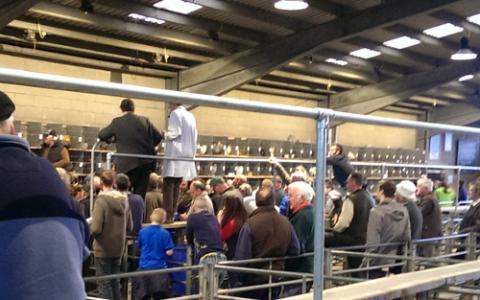
Some dedicated poultry auctions can sometimes have reasonable quality stock and some houses have better reputations than others. But be warned, some of the more common livestock type auctions can be a great place for people to get rid of their sub-standard or unhealthy birds.
Once something is sold at auction there is generally no comeback at all, sales are mostly sold as seen.
There are commonly two types of auction for poultry, those in which you can sell anything, where the quality tends to be quite variable and catalogue sales where birds need to be of a certain quality and generally need to be sold in pairs or trio's.
Where ever you end up buying your birds from, if you make sure they are fit and healthy, you generally shouldn’t see any problems. If you already have chickens and are adding to your flock then you can be bringing disease in so always remember to quarantine your new birds for at least a fortnight and preferably longer before introducing them to your flock.
What should you be buying and looking out for?
Below: These 3 young light Sussex in the picture above are a good age, you can tell they aren't old birds. They are happy and relaxed and being young they will settle into their new home easily. They would make a good purchase.
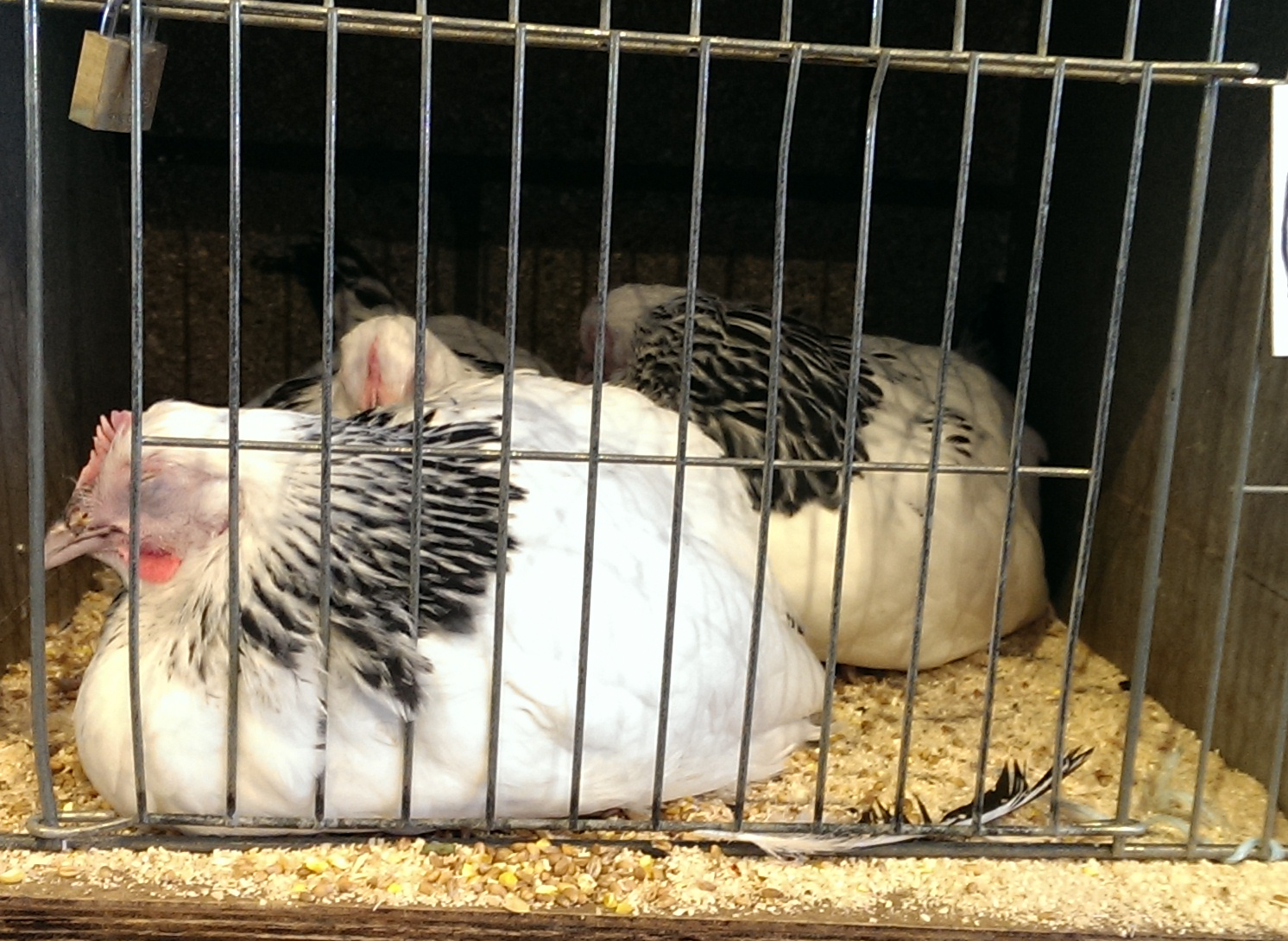
You should visit the auction before you actually buy to get used to the place and to see what is on offer. Auctions tend to be fast paced and can take a little getting used to.
Set your limits and don't go over as you could end up paying way over the odds for chickens.
Choose you chickens carefully and make sure you get the sex you want, I do know of people who ended up with a cage full of cockerels after an auction.
If you want a specific breed you will probably need to attend a specialist catalogue rather than a general sale. Know your breed standard before you go.

Above: Take a close look at the two Barnevelders in the combined image above, the bird on the left has a large floppy comb which is a fault in the Barnevelder and the bird on the right is poorly laced.
Make sure you know how to identify old birds, Auctions are a common way to get rid of old hens with a young cockerel.
Fur & Feather Market - Some auction marts have weekly auctions of poultry, waterfowl, rodents, rabbits, ferrets & pigeons plus hatching eggs and poultry accessories.
Buying second hand incubators and brooders is fraught with peril, they may not work and could be dangerous.
Buy hatching eggs at auction - Most Auctions sell hatching eggs and again these are as much of a gamble. Unless you know the seller it is likely the eggs will be quite old and may have had a rough journey. You also only have the breeders word that they are the breed they are sold as.
My local auction mart, Clitheroe, featuring over 500 cages and catalogue sales attract buyers and sellers nationwide. Sales are usually well subscribed but it can vary, mostly with the time of year. You should find a variety of breeds to suit all requirements, they are well worth a visit!
In addition, there is a sale of cage & aviary birds including parrots, cockatiels, budgies, canaries, and lovebirds.
General Auction Information for general sales - All livestock entries are delivered on the day of sale, therefore no catalogue is available.
Viewing time is on the day of the sale generally from around midday until the start of the sale later in the day.
A Buyers Premium normally applies on the hammer price of each lot. You need to keep the buying and selling fees in mind at auctions
Cash, debit cards and credit cards are usually accepted but can be subject to a surcharge of the total invoice amount (as much as 3%)
Vendor ( seller) Information - Anybody wishing to sell at the fur & feather sale should deliver the livestock entries on day of the sale. Remember to leave food and water if the birds are to be confined for any length of time.
Auctions deducts commissions, even if lots are unsold!
Pure Bred Poultry & Waterfowl Catalogue Sales - These are generally monthly or bi-monthly catalogue sales of pure bred poultry & waterfowl, hatching eggs and accessories are very popular and well subscribed and this generally reflects in the price you pay as well as higher commissions. With catalogues available well before the sale customers are able to view the variety of different breeds of quality breeding stock available.
All livestock entries are delivered on the day of sale, however. Viewing time is on the day of the sale from early in the morning until the start of the sale at midday and the sales take much longer.
Vendor Information for catalogue sales – selling at the catalogue sale is usually a more involved process that requires registration and fees. You should complete and return the relevant entry form as instructed and pre book cages for the sale if the mart requires this.
Auction houses deduct commissions, as much as 15% of the hammer price per lot/cage subject to a minimum per lot whether sold or unsold.
Always take a torch to auctions as cages can be dark and you don't want to buy birds with leg mite or other problems that you could have seen.
Watch out for old birds that are being sold after a moult – they will look young and in good condition.
Look for sellers that have a reputation to protect, they are likely to be selling better stock but you will pay more.
Chicken suppliers and grower farms:
A contract grower is an independent farmer who chooses to invest and build chicken houses and works under contract with a chicken production and processing company to raise either broilers or egg laying chickens. More than 90% of all chickens raised in the US and probably the world over are raised by contract farmers.
They sell to the public because they overproduce slightly and it's these birds you can choose from after the contact orders have been satisfied.
How do you know your supplier is fit for purpose, take a look at these 2 examples:
I have bought birds from both of these places over the years and no these links are not affiliate. I am recommending them as I have had good service and good birds over the years and I know others who have as well.
Birds are vaccinated and salmonella tested.
What makes them a good supplier.
- You can see the birds they don't try to hide them away.
- There is a good selection.
- They tell and show you their rearing process.
- The birds are vaccinated and wormed.
- They have been seen by a vet and staff are trained and the place is subject to record keeping.
- You know your getting a young bird just coming to POL.
- The birds have been handled well and are not frightened of people.
What are shortcomings - You wont get a rare breed or a big choice of them anyway and you might have to wait for a batch to be ready.
Rescue and Ex battery chickens:
This has become a far too common practice in the UK - rescuing spent hens doomed to slaughter after they have done their 72 weeks slavery. I am very much I favour of keeping hens free range but I fell the practise of saving ex battery hens although noble is misguided and certainly not for everyone.

Before you rant at me, I have gotten spent commercial hens before so have plenty of experience. I also know that the farmer makes much more money from the £1 you pay him for the bird you save over the £1.16 it costs him to dispose of the flock. It seem you are playing into the chicken farmers hands by saving them nearly £2.50 a chicken.
Also I often get to pick up the pieces when keepers find out how much hard work rehabilitating commercial hens is. I currently have 34 ex-batts I have gotten from 7 different individuals who gave them up.
If you want to go this route then contact a charity like the BHWT.
Buying fertile eggs and hatching your own:
You can start from scratch and buy hatching eggs and buy or borrow an incubator. Don't be tempted make a home built polystyrene one with incandescent light bulbs they are a huge fire risk. Get hold of or borrow a decent one.
This is a rewarding way into chicken keeping and it means you birds will grow up with you and have a head start when it comes to taming them. You will have to wait up to 30 weeks for an egg though. And they are cute as anything till they grow feathers and start flying around your house like unguided missiles.
Day old chicks in the post or from the store:
There are plenty of hatcheries that ship day old chick by courier and some farm and feed stores that get chicks in to sell when they are available.
From a poultry show.
It doesn't happen at all of the shows I have been to but often there are pens of birds for sale at shows. An advantage of this method is the have probably come from a decent breeder and will have had to pass an inspection to get into the show arena.
The downside is they are likely to be expensive and will be the birds that did not make the grade for the breeders flock.
Joining a local poultry club or Facebook group:
This is a networking way of finding poultry for sale and it may take a little time.
Advantages are that you are getting from a local breeder that hopefully has a reputation to uphold.
Finally – Don’t forget to take a box! With holes in!
Most breeders ask you to bring your own carriers or suitably sized cardboard boxes to transport your chickens in. Keep the sun off the birds and they will need plenty of fresh air or they can overheat

